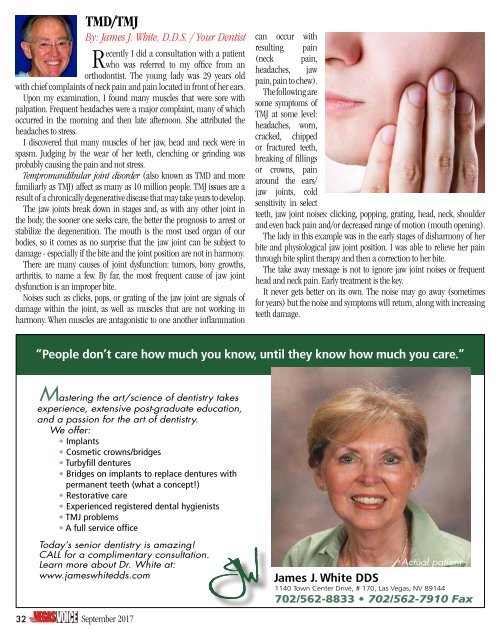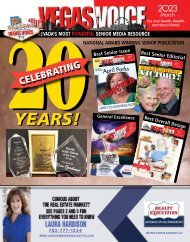10-17 web
Create successful ePaper yourself
Turn your PDF publications into a flip-book with our unique Google optimized e-Paper software.
TMD/TMJ<br />
By: James J. White, D.D.S. / Your Dentist<br />
Recently I did a consultation with a patient<br />
who was referred to my office from an<br />
orthodontist. The young lady was 29 years old<br />
with chief complaints of neck pain and pain located in front of her ears.<br />
Upon my examination, I found many muscles that were sore with<br />
palpation. Frequent headaches were a major complaint, many of which<br />
occurred in the morning and then late afternoon. She attributed the<br />
headaches to stress.<br />
I discovered that many muscles of her jaw, head and neck were in<br />
spasm. Judging by the wear of her teeth, clenching or grinding was<br />
probably causing the pain and not stress.<br />
Tempromandibular joint disorder (also known as TMD and more<br />
familiarly as TMJ) affect as many as <strong>10</strong> million people. TMJ issues are a<br />
result of a chronically degenerative disease that may take years to develop.<br />
The jaw joints break down in stages and, as with any other joint in<br />
the body, the sooner one seeks care, the better the prognosis to arrest or<br />
stabilize the degeneration. The mouth is the most used organ of our<br />
bodies, so it comes as no surprise that the jaw joint can be subject to<br />
damage - especially if the bite and the joint position are not in harmony.<br />
There are many causes of joint dysfunction: tumors, bony growths,<br />
arthritis, to name a few. By far, the most frequent cause of jaw joint<br />
dysfunction is an improper bite.<br />
Noises such as clicks, pops, or grating of the jaw joint are signals of<br />
damage within the joint, as well as muscles that are not working in<br />
harmony. When muscles are antagonistic to one another inflammation<br />
can occur with<br />
resulting pain<br />
(neck pain,<br />
headaches, jaw<br />
pain, pain to chew).<br />
The following are<br />
some symptoms of<br />
TMJ at some level:<br />
headaches, worn,<br />
cracked, chipped<br />
or fractured teeth,<br />
breaking of fillings<br />
or crowns, pain<br />
around the ears/<br />
jaw joints, cold<br />
sensitivity in select<br />
teeth, jaw joint noises: clicking, popping, grating, head, neck, shoulder<br />
and even back pain and/or decreased range of motion (mouth opening).<br />
The lady in this example was in the early stages of disharmony of her<br />
bite and physiological jaw joint position. I was able to relieve her pain<br />
through bite splint therapy and then a correction to her bite.<br />
The take away message is not to ignore jaw joint noises or frequent<br />
head and neck pain. Early treatment is the key.<br />
It never gets better on its own. The noise may go away (sometimes<br />
for years) but the noise and symptoms will return, along with increasing<br />
teeth damage.<br />
Leaving the Hospital? Tips to Prepare You for Home<br />
By: Regale Harris / Your Kindred Team<br />
If you find yourself in the hospital it can be<br />
very exciting when your physician finally<br />
tells you that you can go home. It’s important to<br />
prepare for your return home to make sure your transition is successful.<br />
How do you keep your home safe? What can you do if there’s a problem?<br />
Before You Head Home<br />
After your hospital stay, you may not be able to get around as well as<br />
you once did, and you may need assistance. With that in mind, take a<br />
moment to assess your home.<br />
Practice using a cane, walker,<br />
crutches, or a wheelchair before leaving<br />
the hospital, if you can. It is especially<br />
important to practice the correct ways to:<br />
1. Sit down to use the toilet and stand up after<br />
using the toilet.<br />
2. Get in and out of the shower and use of<br />
shower chair.<br />
3. Go up and down stairs.<br />
Ask your doctor if there are specific foods you should try to eat or avoid<br />
eating. Then, ask a loved one or friend if they can help you get groceries<br />
before heading home.<br />
Make a list of your medications and dosage and when you should take<br />
them. Then organize your medication in a pillbox so your loved ones can<br />
help you take the medicine at the correct time.<br />
Confirm bathing instructions with your doctor. Are there any special<br />
instructions if you have an incision site or wound?<br />
Preparations to Make Your First Day<br />
1. If possible, enter your home without climbing steps. If you need to<br />
climb steps, ask someone if they could be available to provide assistance<br />
if needed. Make sure the handrails are secure and a light can be turned<br />
on from the top and the bottom of the stairs.<br />
2. Set up a “command center” near the chair you will be using most<br />
often. Make sure to keep your phone near, all remotes needed and a water<br />
bottle to stay hydrated.<br />
3. Make sure everything you need<br />
is easy to get to. Consider setting up a<br />
temporary bedroom on the main level if you<br />
must climb stairs to reach your bedroom. Make<br />
sure a bathroom is available, ideally on the same<br />
floor.<br />
4. Remove small throw rugs, and make sure area<br />
rugs have non-slip backing or are taped down with<br />
double-sided tape.<br />
5. Be sure a telephone is easily accessible in each room of the main<br />
living areas. If using a cordless or cell phone, be sure the charger is easily<br />
accessible and the phone is fully charged.<br />
If you have healthcare questions, call 1.866.KINDRED to speak with<br />
one of our Registered Nurses.<br />
Regale Harris is the Manager of Volunteer Services and<br />
Community Liaison for Kindred. She welcomes all questions and<br />
inquiries and can be reached at: regale.harris@kindred.com.<br />
“People don’t care how much you know, until they know how much you care.”<br />
32<br />
M<br />
astering the art/science of dentistry takes<br />
experience, extensive post-graduate education,<br />
and a passion for the art of dentistry.<br />
We offer:<br />
• Implants<br />
• Cosmetic crowns/bridges<br />
• Turbyfill dentures<br />
• Bridges on implants to replace dentures with<br />
permanent teeth (what a concept!)<br />
• Restorative care<br />
• Experienced registered dental hygienists<br />
• TMJ problems<br />
• A full service office<br />
Today’s senior dentistry is amazing!<br />
CALL for a complimentary consultation.<br />
Learn more about Dr. White at:<br />
www.jameswhitedds.com<br />
September 20<strong>17</strong><br />
Actual patient<br />
James J. White DDS<br />
1140 Town Center Drive, # <strong>17</strong>0, Las Vegas, NV 89144<br />
702/562-8833 • 702/562-79<strong>10</strong> Fax<br />
33

















